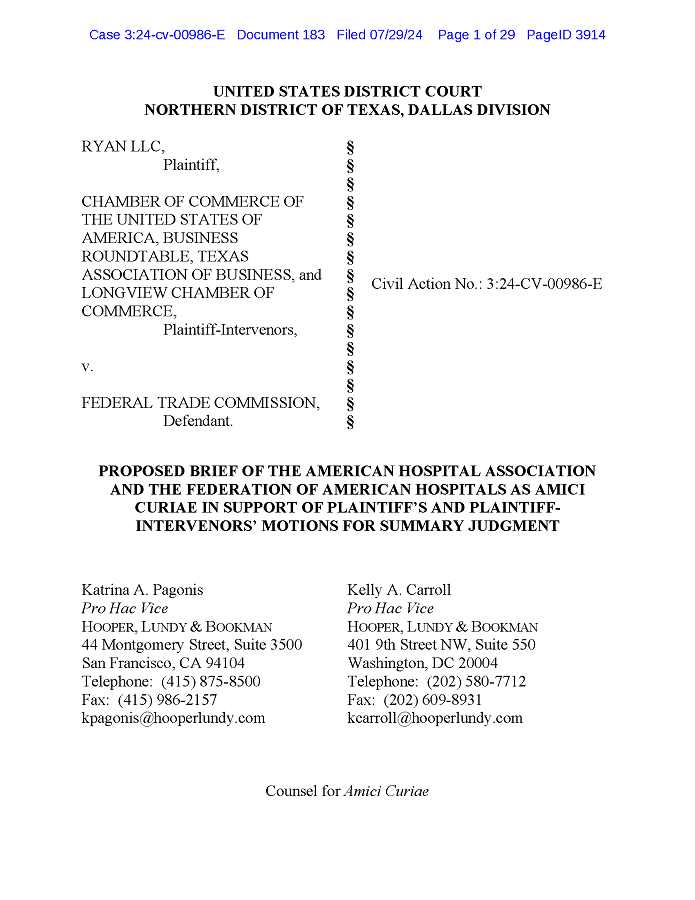

AHA, FAH Amicus Brief in FTC Non-Compete Case
UNITED STATES DISTRICT COURT
NORTHERN DISTRICT OF TEXAS, DALLAS DIVISION
RYAN LLC,
Plaintiff,
CHAMBER OF COMMERCE OF THE UNITED STATES OF AMERICA, BUSINESS ROUNDTABLE, TEXAS ASSOCIATION OF BUSINESS, and LONGVIEW CHAMBER OF COMMERCE,
Plaintiff-Intervenors,
v.
FEDERAL TRADE COMMISSION,
Defendant.
§
§
§
§
§
§
§
§
§
§
§
§
§
Civil Action No.: 3:24-CV-00986-E
PROPOSED BRIEF OF THE AMERICAN HOSPITAL ASSOCIATION AND THE FEDERATION OF AMERICAN HOSPITALS AS AMICI CURIAE IN SUPPORT OF PLAINTIFF’S AND PLAINTIFF-INTERVENORS’ MOTIONS FOR SUMMARY JUDGMENT
Katrina A. Pagonis
Pro Hac Vice
HOOPER, LUNDY & BOOKMAN
44 Montgomery Street, Suite 3500
San Francisco, CA 94104
Telephone: (415) 875-8500
Fax: (415) 986-2157
kpagonis@hooperlundy.com
Kelly A. Carroll
Pro Hac Vice
HOOPER, LUNDY & BOOKMAN
401 9th Street NW, Suite 550
Washington, DC 20004
Telephone: (202) 580-7712
Fax: (202) 609-8931
kcarroll@hooperlundy.com
Counsel for Amici Curiae
Interest of the Amici Curiae
Amici curiae are the American Hospital Association (“AHA”) and the Federation of American Hospitals (“FAH”) (together, “Amici”), national associations representing hospitals and health systems.
The AHA represents nearly 5,000 hospitals, healthcare systems, and other healthcare organizations. Its members are committed to improving the health of the communities that they serve, and to helping ensure that care is available to and affordable for all Americans. The AHA educates its members on healthcare issues and advocates on their behalf, so that their perspectives are considered in formulating health policy. One way in which the AHA promotes its members’ interests is by participating as amicus curiae in cases with important and far-ranging consequences.
The FAH is the national representative of more than 1,000 leading taxpaying hospitals and health systems throughout the United States. FAH members provide patients in urban and rural communities with access to high-quality, affordable healthcare. Its members include teaching and non-teaching, acute, inpatient rehabilitation, behavioral health, and long-term care hospitals. They provide a wide range of acute, post-acute, emergency, children’s, cancer care, and ambulatory services.
Dedicated to a market-based philosophy, the FAH provides representation and advocacy on behalf of its members to Congress, the executive branch, the judiciary, media, academia, accrediting organizations, and the public. FAH routinely submits comments to the Centers for Medicare & Medicaid Services (“CMS”) on Medicare and Medicaid payment and rulemakings and offers guidance to courts regarding Medicare and Medicaid reimbursement principles. FAH member hospitals serve some of our country’s most vulnerable communities.
Amici, their members, and the healthcare ecosystem would be adversely impacted if the Federal Trade Commission’s (the “Commission” or “FTC”) rule prohibiting non-compete clauses, 89 Fed. Reg. 38,342 (May 7, 2024) (the “NonCompete Rule” or “Rule”) goes into effect. As the AHA stated in a public comment in response to the Rule, while “[t]he AHA respects the FTC’s efforts to address issues of genuine unequal bargaining power between certain employers and certain types of workers . . . the proposed rule would profoundly transform the health care labor market – particularly for physicians and senior hospital executives.” See AHA, Cmt. Ltr. Proposed Non-Compete Clause Rule (Feb. 22, 2023), at 1–2, available at https://www.regulations.gov/comment/FTC-2023-0007-8138 (hereinafter “AHA Cmt.”). The Rule “would instantly invalidate millions of dollars of existing contracts, while exacerbating problems of health care labor scarcity, especially for medically underserved areas like rural communities.” Id. at 2.
Importantly, the FTC does not have the statutory authority to apply its rule to nonprofit entities that are exempt under Section 501(c)(3) of the Internal Revenue Code, including nonprofit hospitals and health systems. See 15 U.S.C. § 44. As such, only the taxpaying hospital and health-system members of the FAH and AHA would be subject to the requirements of the Non-Compete Rule. This could cause a significant “distortion in the competitive playing field” for hospital labor. FAH, Cmt. Ltr. Proposed Non-Compete Clause Rule (Feb. 22, 2023), at 2, available at https://www.regulations.gov/comment/FTC-2023-0007-21034 (hereinafter “FAH Cmt.”). Indeed, the Rule’s disparate treatment of taxpaying vs. tax-exempt, nonprofit entities could significantly disrupt health care labor markets regardless of hospital ownership type. As the AHA explained, “this disequilibrium could reduce the available supply of highly-trained, highly-skilled labor for forprofit hospitals in particular markets, driving up the price for such labor or at least creating serious instability in those markets. Market distortions of this kind would arise in the context of an already-challenging workforce shortage for America’s hospitals.” AHA Cmt. at 16; see also FAH Cmt. at 7 (“The uneven playing field the Noncompete Rule would impose between taxpaying and tax-exempt hospitals is illogical and would create significant, unintended, and anticompetitive distortions.”).
In light of these potential consequences, both Amici filed public comments urging the Commission to more narrowly-tailor its Rule, exempting the healthcare industry or, at a minimum, exempting highly-skilled, highly-compensated physicians and the hospitals’ executives who have greater bargaining power than lower-skilled, lower-wage workers. See AHA Cmt. at 7–17; FAH Cmt. at 6–16. As the AHA concluded: “[T]he proposed regulation errs by seeking to create a one-size-fits all rule for all employees across all industries, especially because Congress has not granted the FTC the authority to act in such a sweeping manner.” AHA Cmt. at 2. For these reasons, Amici have an acute interest in the proper resolution of this case.


